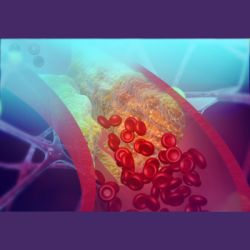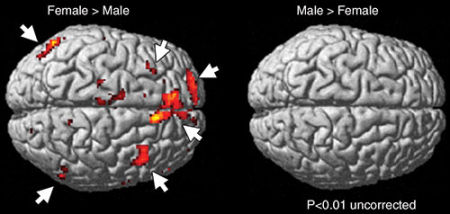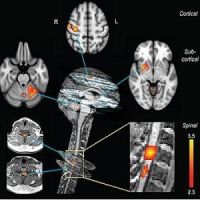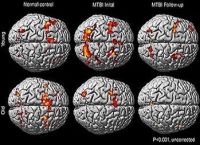A new study published in Radiology indicates that women may have a more difficult time than men in recovering from concussion, also known as mild traumatic brain injury (MTBI). “In clinical practice, more women than men seek medical attention due to persistent symptoms after MTBI at a ratio of almost 2:1,” said lead author, Chi-Jen Chen, MD, Department of Diagnostic Radiology and Brain and Consciousness Research Center at Taipei Medical University Shuang-Ho Hospital (Taiwan).
Concussion affects cognitive function and quality of life in some individuals. It usually takes three months for MTBI patients to have a full recovery. Some 10-15 percent of MTBI patients, however, experience persistent disabling problems even after three months. These problems can include post-traumatic headache, sleep disturbance, memory and other cognitive impairments, loss of balance, fatigue, and mood or affective disorders.
The lasting effects of concussion have caused growing concern in recent years, especially among amateur and professional athletes and sports organisations. According to some reports, female athletes suffer concussions at a higher rate than male athletes playing similar sports.
“We started to wonder whether there might be differences in MTBI outcomes between men and women,” said Dr. Chen, who is also superintendent at Chia-Yi Hospital in Taiwan. He and colleagues decided to examine gender differences in MTBI by using functional magnetic resonance imaging (fMRI) to analyse brain activation patterns during working memory tasks.
“Difficulty with working memory is a commonly reported impairment after MTBI,” Dr. Chen noted. “Since working memory is important for a wide variety of cognitive skills, compromised working memory could have significant effects on everyday life.”
Dr. Chen's team studied 30 patients with MTBI and 30 control patients (both groups with an equal number of men and women). Patients underwent an fMRI exam within one month after injury and a follow-up fMRI exam at six weeks after first scan. In addition, participants underwent neuropsychological tests, including digit span and continuous performance test (CPT). Digit span is a short-term memory test measuring how many numbers a participant can remember in sequence. CPT measures a person’s sustained and selective attention and impulsivity.
The team reported these key findings:
“These findings provide evidence that female gender may be a risk factor for working memory impairment after MTBI,” said Dr. Chen. “If so, more aggressive management should be initiated once MTBI is diagnosed in female patients.” He notes, however, that further research should be done to validate these preliminary findings.
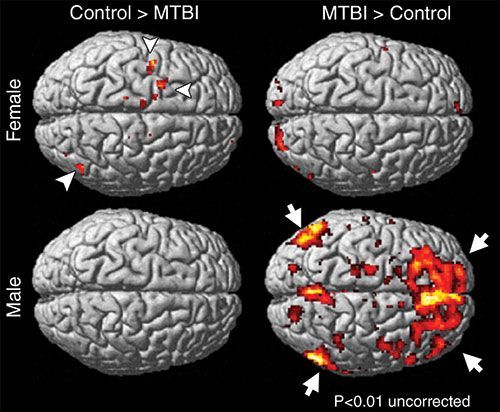
Figure 1. Sex differences of working memory functional activation at initial study of patients with MTBI compared with control subjects in response to increased working memory load. Voxel-by-voxel comparison of initial studies of patients with MTBI and control subjects shows a little more activation in the working memory circuitry (arrowheads) in female control subjects than in female patients with MTBI. However, substantially more activation (arrows) is seen in male patients with MTBI than in male control subjects.
Source and image credit: Radiological Society of North America
Concussion affects cognitive function and quality of life in some individuals. It usually takes three months for MTBI patients to have a full recovery. Some 10-15 percent of MTBI patients, however, experience persistent disabling problems even after three months. These problems can include post-traumatic headache, sleep disturbance, memory and other cognitive impairments, loss of balance, fatigue, and mood or affective disorders.
The lasting effects of concussion have caused growing concern in recent years, especially among amateur and professional athletes and sports organisations. According to some reports, female athletes suffer concussions at a higher rate than male athletes playing similar sports.
“We started to wonder whether there might be differences in MTBI outcomes between men and women,” said Dr. Chen, who is also superintendent at Chia-Yi Hospital in Taiwan. He and colleagues decided to examine gender differences in MTBI by using functional magnetic resonance imaging (fMRI) to analyse brain activation patterns during working memory tasks.
“Difficulty with working memory is a commonly reported impairment after MTBI,” Dr. Chen noted. “Since working memory is important for a wide variety of cognitive skills, compromised working memory could have significant effects on everyday life.”
Dr. Chen's team studied 30 patients with MTBI and 30 control patients (both groups with an equal number of men and women). Patients underwent an fMRI exam within one month after injury and a follow-up fMRI exam at six weeks after first scan. In addition, participants underwent neuropsychological tests, including digit span and continuous performance test (CPT). Digit span is a short-term memory test measuring how many numbers a participant can remember in sequence. CPT measures a person’s sustained and selective attention and impulsivity.
The team reported these key findings:
- Initial fMRI results of the MTBI patients showed increased activation in working memory brain circuits in the men and decreased activation in the women, compared to the controls.
- At follow-up, men with MTBI returned to a normal activation pattern similar to the controls, whereas the women showed persistent hypoactivation, suggesting ongoing working memory problems.
- Neuropsychological results showed that among the women, the total digit span score was lower in the MTBI group, compared to the control group.
“These findings provide evidence that female gender may be a risk factor for working memory impairment after MTBI,” said Dr. Chen. “If so, more aggressive management should be initiated once MTBI is diagnosed in female patients.” He notes, however, that further research should be done to validate these preliminary findings.
_____________________________________
Top image: Sex differences of working memory functional activation in healthy control subjects in response to increased working memory load. A voxel-by-voxel comparison of female (left image) and male (right image) control subjects shows more activation (arrows) in female control subjects than in male control subjects.
Figure 1. Sex differences of working memory functional activation at initial study of patients with MTBI compared with control subjects in response to increased working memory load. Voxel-by-voxel comparison of initial studies of patients with MTBI and control subjects shows a little more activation in the working memory circuitry (arrowheads) in female control subjects than in female patients with MTBI. However, substantially more activation (arrows) is seen in male patients with MTBI than in male control subjects.
Source and image credit: Radiological Society of North America
Latest Articles
Concussion, mTBI, fMRI, brain injury, memory, traumatic
A new study published in Radiology indicates that women may have a more difficult time than men in recovering from concussion, also known as mild traumatic...




